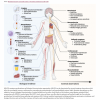Jonathan Edwards
Senior Member (Voting Rights)
I am sure the Melbourne team have the best of intentions here but I do agree that this is not a very well written review.
I used to insist that doctoral students wrote a review before I offered them a doctoral attachment, to see if they could think critically enough for it to be worth them going for a doctorate, but I rarely suggested that they published the result, which by definition was not an expert view. The literature is groaning under the weight of reviews written by novices.
I am currently supervising a bachelors literature review project and this reminds me rather of my student's first draft. I scrawled at the top: Don't write as if you are an expert narrating history and words of wisdom from the literature. Write as if you don't necessarily believe a bloody word of it and are very dubious about loads of assumptions people have made.'
To me 'precision medicine' is a phoney buzzword. One day such a thing might emerge but inasmuch as personalised medicine exists it has probably been there all along and is much less a feature than it was fifty years ago.
Omics technology is progressing and is fascinating, but why not have at least one interesting example of a new development in the abstract? Without it I didn't read on I am afraid.
Sorry to be critical, but that's the name of the real science game.
And surely defying a simplistic characterisation is a platitude. Simplistic means 'making a description too simple'. (It doesn't just mean simple.) Everything defies characterising by a too simple characterisation!
I used to insist that doctoral students wrote a review before I offered them a doctoral attachment, to see if they could think critically enough for it to be worth them going for a doctorate, but I rarely suggested that they published the result, which by definition was not an expert view. The literature is groaning under the weight of reviews written by novices.
I am currently supervising a bachelors literature review project and this reminds me rather of my student's first draft. I scrawled at the top: Don't write as if you are an expert narrating history and words of wisdom from the literature. Write as if you don't necessarily believe a bloody word of it and are very dubious about loads of assumptions people have made.'
To me 'precision medicine' is a phoney buzzword. One day such a thing might emerge but inasmuch as personalised medicine exists it has probably been there all along and is much less a feature than it was fifty years ago.
Omics technology is progressing and is fascinating, but why not have at least one interesting example of a new development in the abstract? Without it I didn't read on I am afraid.
Sorry to be critical, but that's the name of the real science game.
And surely defying a simplistic characterisation is a platitude. Simplistic means 'making a description too simple'. (It doesn't just mean simple.) Everything defies characterising by a too simple characterisation!

